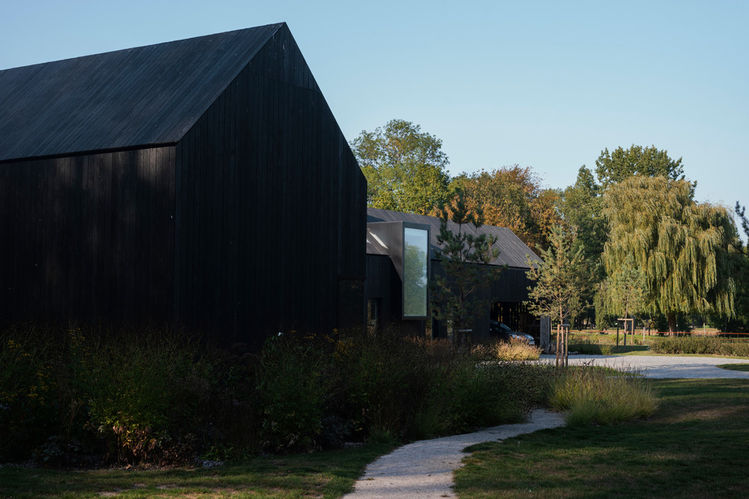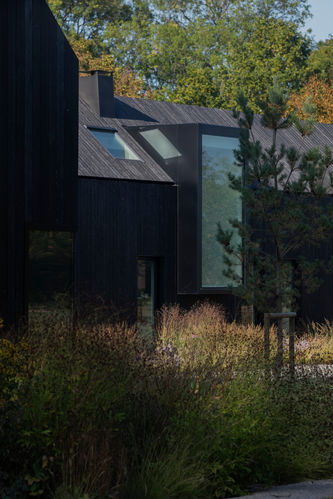
© Julien Lanoo
PROJECT DETAILS:
KNOW MORE ABOUT THE DESIGNERS:
The brief for Residence G was to create a countryside lifestyle in harmony with its surroundings.
The brief for Residence G was to create a countryside lifestyle in harmony with its surroundings. The starting point was the Comte de M. 19th century farm building, constructed in a U-shape around a courtyard, nestled in a fantastic natural setting surrounded by the edge of a forest, a haven of biodiversity. It is located alongside a golf course running through the forest.
The refurbishment and extension of this building sought to showcase the old building and preserve the natural surroundings.
A new entrance zone to the plot has been de designed to provide access to the farm. The courtyard is closed off by this zone, creating a patio overlooked by the rooms in the house. The property is extended with a generous south-facing facade to take advantage of the natural light. Another extension was added to create a family space with a swimming pool.
The farm’s use of form was reinterpreted for the extensions, which blend into the surroundings due to the materials used. The south-side extension naturally fits in with the existing farm. The other extension matches the first extension’s style and is connected to the building via a glass corridor. The farm’s classic facade was retained, whilst the others were redesigned to establish interactions between indoor and outdoor spaces and large dormers were created. Each staircase leading to the upper floors offers views over the forest, golf course or garden.
The main farm building has undergone very few changes. The black substructure and the white painted brick were retained. On the roof, damaged tiles were replaced with similar pantiles to retain the building’s authentic feel. The windows were fitted with double-glazing in black aluminium frames, and large openings were created in the existing facade. These large dormers are made of steel in the same colour as the joinery. The new extensions have a timber frame covered in charred wood cladding, and the carport is made of slatted wood. All the aluminium joinery matches the colours of the main farm building.
Architectural limitations
Before Coldefy’s involvement, the farm building had narrow spaces with low ceilings, which gave the impression of a tight space closed off from the outside. An extension earmarked for the technical services required for the home (water heater, fuse board, laundry room, cellar, garage) was south-facing, preventing a family from enjoying bright living areas and taking advantage of the natural light and warmth. This extension was made of cinder block and metal sheeting, which did not match the main farm building. It was no longer waterproof, plants were growing inside, several areas were affected by mould and diagnoses revealed the presence of asbestos.
The initial review of the land and the surrounding areas
Coldefy defined several areas around the home:
An entrance composed of a tree-lined walk and large grassy plains. This space offers a transition between the urban area and the farm, which is isolated in its unspoilt setting. It provides a generous view over the orchard in the northeast of the plot.
A very pleasant wooded area that is part of the overall landscape, ensuring continuity between the golf course and the farm’s land.
A family garden, the ideal place for different family activities with an extensive view over the golf course.
The courtyard, a charming spot welcoming each person arriving at the farm. This space is particularly well appreciated from the inside
Construction, Materials, Products
Materials
The main farm building has undergone very few changes. The black substructure and the white painted brick were retained. On the roof, the worn tiles were replaced with pantiles in a similar colour to maintain the farm’s authentic feel. The single-glazed windows were replaced with double glazing with black aluminium frames. The large openings created in the existing facade have an iron lintel painted white. Finally, the large dormers created next to the staircases are made of steel in the same colour as the joinery. The visible rainwater downpipes are coated in zinc.
The new extensions are made of a timber frame with charred wood cladding. This wood was chosen specifically to provide the desired colour scheme but also to offer excellent resistance over time. The carport by the extension is made of slatted wood to create a generally more spacious feeling. The joinery is all made of aluminium, which matches the colours of the main farm building. The dormers are made of steel in the same style as those created in the existing building. All rainwater downpipes are visible but integrated into the facade’s design. Where they are exposed for technical reasons, they are coated in zinc.
Landscaping (by the landscaper Thomas Leplat)
The priority was to provide a continual landscape between the golf course and the farm’s plot.
All fences were changed. They were kept simple in order to blend fully into the environment.
The large entranceway comprises two paved paths with a grass strip in the middle. The entrance space in front of the home is a mix of paving, a concrete strip, flowers and grass.
The very natural feel of the wooded space is retained. A gravel path was created between the trees to offer several viewpoints over the golf course and home.
Particular care was taken with the landscaping of the terrace and patio. The terrace and swimming pool have been designed to remain private from the golf course. The terraces are paved and the swimming pool is surrounded by a concrete strip.
GALLERY:

























